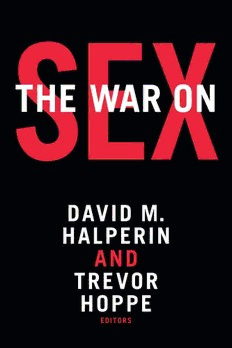
The War on Sex PDF
Preview The War on Sex
the War on Sex David M. Halperin and Trevor Hoppe | editors the War on Sex Duke University Press | Durham and London | 2017 © 2017 Duke University Press All rights reserved Printed in the United States of Amer i ca on acid- free paper ∞ Text designed by Mindy Basinger Hill Cover designed by Matthew Tauch Typeset in Arno Pro by Westchester Publishing Services Library of Congress Cataloging- in- Publication Data Names: Halperin, David M., [date] editor. | Hoppe, Trevor, [date] editor. Title: The war on sex / David M. Halperin and Trevor Hoppe, eds. Description: Durham : Duke University Press, 2017. | Includes bibliographical references and index. Identifiers: lccn 2016045797 (print) lccn 2016047432 (ebook) isbn 9780822363514 (hardcover : alk. paper) isbn 9780822363675 (pbk. : alk. paper) isbn 9780822373148 (ebook) Subjects: lcsh: Sexual minorities—Legal status, laws, etc.—United States. | Sexual minorities—Civil rights—United States. | Sex discrimination in criminal justice administration—United States. | Sex offenders—Legal status, laws, etc.—United States. Classification: lcc kf4754.5 .w37 2017 (print) | lcc kf4754.5 (ebook) | ddc 345.73/0253—dc23 lc record available at https://lccn.loc.gov/2016045797 Contents Foreword: Thinking Sex and Justice trevor hoppe | ix Introduction: The War on Sex david m. halperin | 1 part i The Politics of Sex 1. The New Pariahs: Sex, Crime, and Punishment in Amer i ca roger n. lancaster | 65 2. Sympathy for the Dev il: Why Progressives H aven’t Helped the Sex Off ender, Why They Should, and How They Can judith levine | 126 3. Queer Disavowal: “Controversial Crimes” and Building Abolition owen daniel-mccarter, erica r. meiners, and r. noll | 174 4. A New Iron Closet: Failing to Extend the Spirit of Lawrence v. Texas to Prisons and Prisoners j. wallace borchert | 191 5. Seeing the Sex and Justice Landscape through the Vatican’s Eyes: The War on Gender and the Seamless Garment of Sexual Rights mary anne case | 211 part ii The Invention of the Sex Offender 6. Sex Panic, Psychiatry, and the Expansion of the Carceral State regina kunzel | 229 7. The Creation of the Modern Sex Offender scott de orio | 247 8. For What They Might Do: A Sex Offender Exception to the Constitution laura mansnerus | 268 part iii Sex Work and the Troub le with Trafficking 9. The “Hooker Teacher” Tells All melissa petro | 291 10. Carceral Politics as Gender Justice? The “Traffic in Women” and Neoliberal Cir cuits of Crime, Sex, and Rights elizabeth bern stein | 297 11. California’s Proposition 35 and the Trou ble with Trafficking carol queen and penelope saunders | 323 part iv Making HIV a Crime 12. HIV: Prosecution or Prevention? HIV Is Not a Crime sean strub | 347 13. HIV Monsters: Gay Men, Criminal Law, and the New Po liti cal Economy of HIV gregory tomso | 353 14. HIV Care as Social Rehabilitation: Medical Governance, the AIDS Surveillance Industry, and Therapeutic Citizenship in Neoliberal Taiwan hans tao- ming huang | 378 part v R e sis tance 15. The New War on Sex: A Report from the Global Front Lines maurice tomlinson | 409 16. Building a Movement for Justice: Doe v. Jindal and the Campaign against Louisiana’s Crime Against Nature Statute alexis agathocleous | 429 17. Bringing Sex to the Table of Justice amber hollibaugh | 454 Afterword: How You Can Get Involved Trevor Hoppe | 461 Contributors | 465 Index | 469 This page intentionally left blank Trevor Hoppe Foreword Thinking Sex and Justice When Gayle Rubin declared in her now- famous 1984 essay, “Thinking Sex,” that sex “has its own internal politics, inequities, and modes of oppression,” she was highlighting the urgent need for a coherent analys is of sex on its own terms.1 Reacting against an analys is of sex couched solely in terms of gender, she proposed that scholars and activists needed to come up with new terms for understanding how sex becomes an impor tant site of social control, adju- dication, and — ultimately — oppression. Much has changed since 1984. Gay men, lesbians, and transgender people have made impor tant strides in achieving l egal and social equality as sexual identity and, more recently, gender identity have become widely recognized as illegitimate bases for discrimination. At the same time, hiv/aids has claimed millions of lives and created new fears about sex, adding fuel to long- standing public debates over sexual morality. Yet, despite t hese shifts, very little has been done to realize Rubin’s vision for analyzing and politicizing sex in its own terms — both within and outside of the acad emy. Outside of academia, social movement organi zations such as the New York– based group Sex Panic! or the sexuality- focused Woodhull Sexual Free- dom Alliance are rare. Many of them have typically focused on sexual health and do not generally frame their work in terms of social justice or civil rights. This is changing, as the groundbreaking activism highlighted in the pages that follow demonstrates. But there is much work that remains to be done. Within academia, scholars studying relevant issues tend to work within disciplinary and professional bound aries. The tendency and academic pres- sure to publish in disciplinary journals in many fields means that their work is not often read by scholars outside their immediate field. Conferences also tend to be or ga nized within disciplinary bound aries, further compounding the prob lem.
